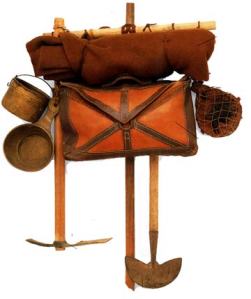About seven years ago, I read G. R. Watson’s The Roman Soldier (originally published by Cornell University in 1969; I read a copy of the 1985 paperback reissue), a handbook summarizing what scholars in 1969 knew about life in the ancient Roman army. One point Watson made that I’ve been thinking about ever since I read the book had to do with the field packs Roman soldiers wore. Some scholars in Germany had tended to give very high estimates of the amount of weight that Roman soldiers had to carry, in some cases solemnly asserting that a legionary would march about all day with over a hundred pounds of equipment on his back. Dismissing these estimates as a self-evident absurdity, Watson tries to figure out just how heavy the pack might have been (in the 1985 reissue, that discussion is on pages 62-66, continued in note 140 on pages 175-176.) The best estimate he can come up with puts the average weight of the Roman soldier’s pack at 30 kilograms (66 pounds,)which happens to be identical to the standard for most modern armies.
Watson’s evidence suggests that throughout history armies have tended to increase the amount of weight soldiers have to carry, until the kit becomes so heavy that the high command has no choice but to cut it down to something weighing about 30 kilograms. I suppose that the obvious reason for this tendency is that many people are involved in deciding what it is essential that a soldier should carry in the field. Each of those people has ideas about items that should be on that list, and each sees the addition of his or her favorite item as a victory. When no one involved in decision-making at that level has to wear a full field pack on a regular basis, the decision makers have no immediate incentive to deny each other their little victories.
I wonder if there might not be a second, less obvious reason for this tendency. Ed Yong’s Not Exactly Rocket Science reports on a psychological experiment which indicates that people who are holding heavy objects tend to take matters more seriously than the same people do when they are not holding heavy objects. If this tendency is and has long been general among all humans everywhere, then we would expect that people who are interested in human behavior would have noticed it. Military commanders are interested in human behavior. Perhaps, noticing the overlap between the category “people holding heavy objects” and the category “people showing seriousness,” commanders have formed the idea that they could induce ever greater seriousness in their subordinates by weighing them down with ever more heavily loaded field packs.
If there’s anything to this speculation of mine, perhaps it is also part of the reason why there is so little protest against the spine-damagingly heavy backpacks that so many American children are forced to lug to and from school every day. Of course, many people are involved in deciding what a student should learn and do in school, and that is an obvious reason why the collection of textbooks and other materials students must transport on their persons tend to grow so heavy.
 But perhaps a belief that the weight of the physical burden one carries correlates directly with the seriousness of one’s attitude is also part of it. We want children to take school seriously. We have observed that people holding heavy objects tend to be serious. If holding heavy objects translates into seriousness, maybe holding even heavier objects will translate into even more seriousness! It will definitely translate into more back injuries, but isn’t that a small price to pay for keeping the wee ones doubled over for much of the day?
But perhaps a belief that the weight of the physical burden one carries correlates directly with the seriousness of one’s attitude is also part of it. We want children to take school seriously. We have observed that people holding heavy objects tend to be serious. If holding heavy objects translates into seriousness, maybe holding even heavier objects will translate into even more seriousness! It will definitely translate into more back injuries, but isn’t that a small price to pay for keeping the wee ones doubled over for much of the day?

